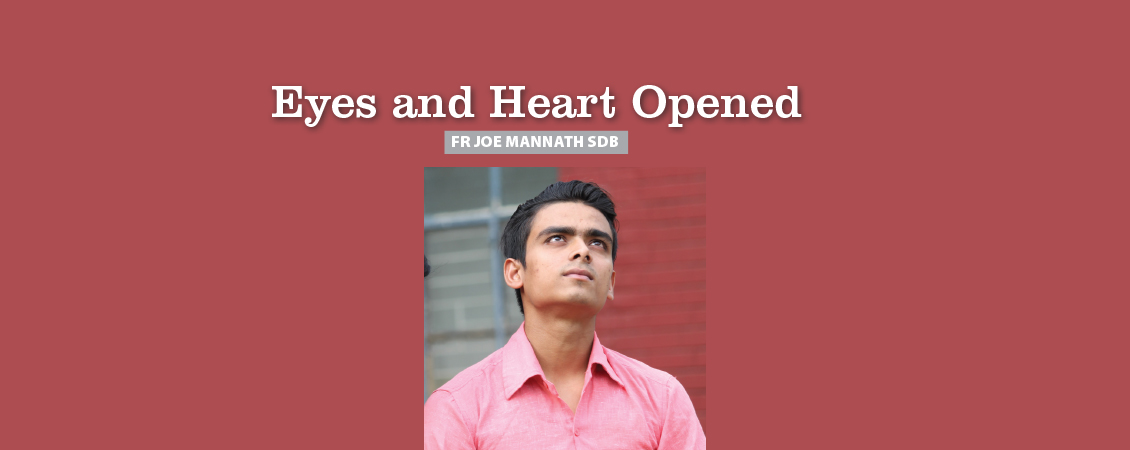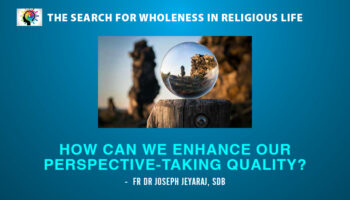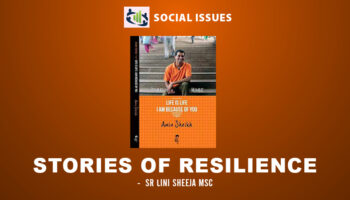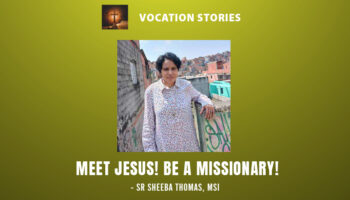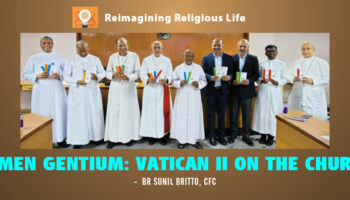What is my deepest experience? What has touched me and changed me radically? Have I found what responds to the deepest desires of my heart? Is this what I share with others? Or, am I living on the surface, and meeting others too on a superficial level, trying to give them what I think they like, rather than what they really need?
Father Alban, an enthusiastic young religious priest in Mumbai, told me of what a young man in Bangalore had told him that really went to his heart.
“Like other theology students, I used to go to some parish for weekend ministry. There we made friends with young people and their families. I would crack jokes and laugh with them, and I thought I was popular.
“A few years later, as a young priest, I visited one of these families. A young man in the family, who had been a boy when I used to visit them as a theology student, told me something simple that touched me deeply. He said, “Father, you were interesting. You cracked jokes. You discussed cricket scores. But you did not give us what we really needed. You did not give us Jesus.”
“This really hit me.
“I decided to be what I am supposed to be as a priest and religious: a person close to God who helps others to get close to God.
“This is what I am trying to be now. As you can see, I am very happy. My priorities are different now, and the Lord fills my life with joy.”
He is more active than ever. But it is a dynamism flowing from a God-centred heart.
From Criminal to Caring Friend
Quite different is the case of a man called Aby, who used to belong to the criminal
“underworld” in an Indian city. He used to the dirty work for powerful people on payment: threaten people, beat them up, break their legs. One day, a priest asked him to go for a retreat. Aby went. He was so transformed by the experience that he not only gave up his criminal ways, but started devoting himself to picking up abandoned people from the streets and looking after them.
Oxford Research on Religious Experience
Alister Hardy was a marine biologist who decided to study religious experience scientifically. Instead of quoting religious texts, he started by collecting personal accounts of people who had what they considered religious experiences. His centre advertised in the secular press in the UK asking people to send in such accounts.
His team was surprised at the response. Thousands of people sent in such accounts. In an apparently secular country like Britain, so many people wrote of their religious experiences. The Alister Hardy Centre in Oxford went on to publish several volumes containing these accounts. One of them, called The Original Vision, is devoted to the religious experiences people had when they were children.
It may look as if people are mostly interested in money, fame, achievements and comfort. But more people have had touching religious experiences than we may think. The experiences published by the Hardy Centre are too many for me to quote here.
Cancer and Prayer
I have met cancer patients who were healed through prayer, and who now lead joyful, productive lives.
I have known others who look after terminally ill cancer patients because of their in Jesus.
The most joyful, the most inspiring, the most committed religious and priests (and lay persons) are persons filled with a spiritual vision. Celibacy, in particular, does not make sense if not chosen and lived out of a spiritual vision. Why on earth say No to two of life’s deepest experiences—spousal love and parenting? If celibacy comes down to just that, it would be a stupid and damaging choice. None of the works we do needs celibacy (or prayer or spiritual practices). Anyone with common sense and ready to work hard can do most of what we do externally.
But the heart of the matter, the secret of a person’s inner glow, the transparent goodness of persons free of power-games, manipulation and group-based loyalties—that secret lies beyond social analysis, psychological categories and human cleverness.
What Wealth Cannot Provide
Clare was such a person. She came from a wealthy Japanese family. Her father was one of the directors of the finance company, Mitsui. Her older sister was married to an IBM executive. Clare too had a boy friend, and they were planning to marry. Then she felt this “other call” and told her parents about it. She went to a convent to spend some time there and see what religious life is. She told the Sisters about having a fiancé, and they told her that is beautiful. She found life in the convent very hard (materially), since she was used to luxury. So, she thanked the sisters and went back home. But, she told me, “For a week, I reflected. I found that I have much at home, but I do not need any of these things to be happy. Jesus Christ is enough for me.” She went back and joined the convent. Now, decades later, she says, “I have never lost the joy of my vocation.”
Mother Teresa told an interviewer: “I come from a happy family. I would not have left it to become a social worker.” She did fantastic service to the poorest, of course, but she di d not see herself as a social worker. For her, life was about meeting Jesus. She felt called to meet him and love him in the most unwanted of persons.
Ramakrishna’s Influence
The Ramakrishna Mission was founded by Swami Vivekananda, whose original name was Narendranath Datta. As a bright and sceptical young man, Narendranath went to see the village priest Ramakrishna. The holy man had been waiting for Narendranath. When asked, “How do you know there is a God?” Ramakrishna did not offer him any logical arguments. He told the young man, “Because I see Him more clearly than I see you.”
God-experience is more powerful than arguments and discussions.
What is your deepest religious experience? What keeps you going when you face hurdles or feel empty?
Who am I? What am I?
What is our identity as religious and priests? What is our heart’s deepest quest? What has touched us and filled us most meaningfully? What do we feel called to share with others? If what we share is only financial support, or academic knowledge (as in a school) or medical competence or political analysis, we need not be religious and priests to do this. Are we giving people what they have a right to expect from us—an joyful and inspiring life based on Jesus’ life and teachings, a way of seeing and treating people that is different from the world’s ways?

Religious experience, when genuine and deep, does not cut us off from people. It immerses us more deeply into the human journey. It shows us our weakness, vulnerability and the humanity we share with everyone. No wonder mystics are the most human of human beings and the most fully alive.
Want an example? Here is one.
Right in the shopping area…something very unusual
In the middle of a busy American city called Louisville in the state of Kentucky, there is an unusual plaque. It commemorates an experience Thomas Merton, the famous trappiest monk and writer had while walking through that busy street. Merton writes:
“In Louisville, at the corner of Fourth and Walnut, in the center of the shopping district, I was suddenly overwhelmed with the realization that I loved all these people, that they were mine and I theirs, that we could not be alien to one another even though we were total strangers. It was like waking from a dream of separateness, of spurious self-isolation in a special world. . . . This sense of liberation from an illusory difference was such a relief and such a joy to me that I almost laughed out loud. . . . I have the immense joy of being man, a member of a race in which God Himself became incarnate… I realize what we all are. And if only everybody could realize this! But it cannot be explained. There is no way of telling people that they are all walking around shining like the sun.
“Then it was as if I suddenly saw the secret beauty of their hearts, the depths of their hearts where neither sin nor desire nor self-knowledge can reach, the core of their reality, the person that each one is in God’s eyes. If only they could all see themselves as they really are. If only we could see each other that way all the time. There would be no more war, no more hatred, no more cruelty, no more greed. . . . But this cannot be seen, only believed and ‘understood’ by a peculiar gift.”
The mystical is not only the deepest of experiences. It makes us more fully human, and more deeply immersed in the human race. We see all that is human in a refreshingly new way. We have a new vision, a new energy. There is no more room for pettiness, divisions, hatred or gossip; for injustice, greed or back-stabbing. We see our oneness. We are in touch with the heart of reality.
Deep religious experience flows into compassionate and courageous service. It does not cut us off or makes us blind and indifferent. But what we bring to people is not simply financial support or political acumen, or the latest theories, but the power of a transformed heart and a God-centred life.
May those who meet us find this to be true of us.
Fr Joe Mannath SDB
To subscribe to the magazine, click Subscribe
